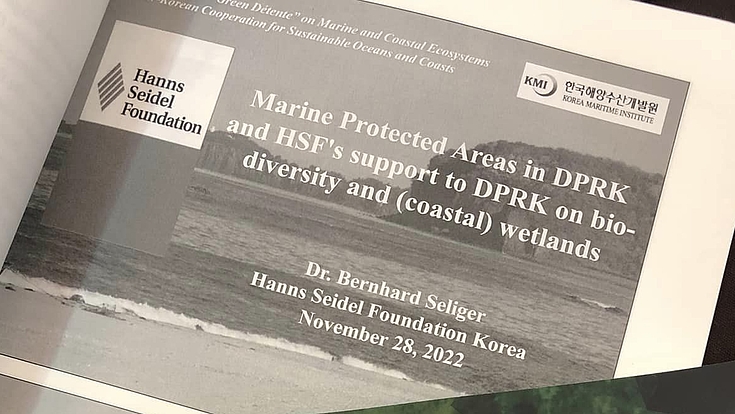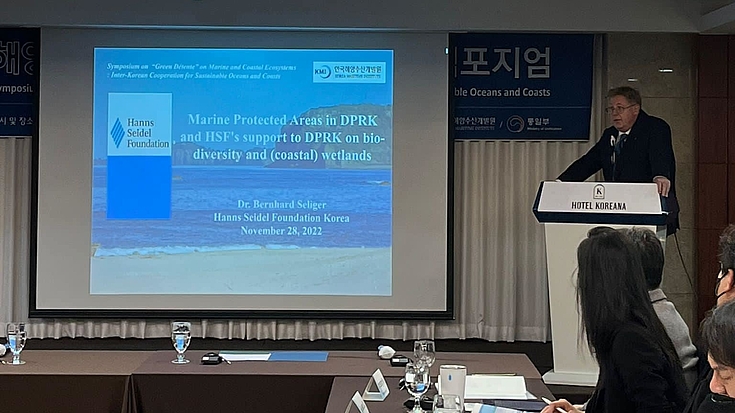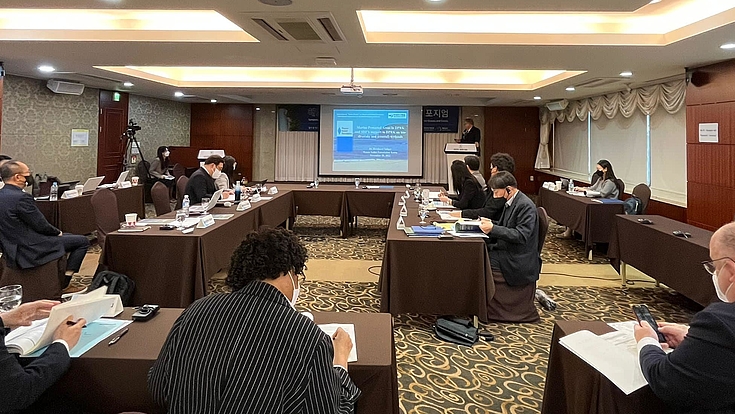Symposium
“Green Détente” on Marine and Coastal Ecosystems: Inter-Korean Cooperation for Sustainable Oceans and Coasts

The protection of oceans from pollution and the protection of marine biodiversity is an increasingly important topic, directly linked to the livelihood of millions of people, but also the ecological health. Unsustainable practices of fisheries, for example, pollution and climate change all challenge the health of oceans. This is also true for the Yellow Sea area, where hundreds of millions of inhabitants of coastal areas in China, North and South Korea live together. While the challenge is great, it might also lead to greater cooperation between North and South Korea.
On November 28, 2022, the Korea Maritime Institute convened in Seoul a group of experts from Korea and abroad to discuss the issues of inter-Korean cooperation for sustainable oceans and coasts, sponsored by the Ministry of Unification. Dr. Choi Sang-Hee, Vice President of the KMI, opened the symposium and highlighted that the topic of cooperation on maritime issues has been rather undervalued in previous cooperation of North and South. Kim Kwang-Gil, Director-General of the Ministry of Unification, which sponsored the symposium, put inter-Korean cooperation in green fields or “green détente” into the perspective of the “bold initiative” of the government of President Yoon Seok-Yeol. Even before denuclearization, green détente could be a way of rapprochement of both parts of Korea.

The first presentation by Rouna A of UN-ESCAP Northeast Asia office detailed the work of the NEASPEC, the Northeast Asian Subregional Program on Environmental Cooperation, in which six states of Northeast Asia (China, Japan, South Korea North Korea, Mongolia, and Russia) cooperate to protect biodiversity and work for a sustainable future. Dr. Suh Seungoh, Executive Director of the Ramsar Regional Center in Suncheon discussed the involvement of North Korea in various international nature protection networks, in particular the Ramsar Convention on Wetlands. Dr. Bernhard Seliger of Hanns-Seidel-Foundation Korea looked at North Korean marine protected areas and wetlands and how they can be supported by international capacity building. He concluded his presentation with potential ideas for cooperation and engagement with North Korea, giving proposals based on the experiences of HSF, not only to other international organizations or institutes but also to South Korea. Finally, Dr. Nam Jungho together with colleagues Kim Juhyung, Kim Jiyoon and Lee Hyeyeong proposed a “blue agenda” for inter-Korean cooperation putting maritime issues into the focus of inter-Korean cooperation.

The second session saw a roundtable discussion chaired by Dr. Chu Jang-Min of the Korea Environmental Institute. He was joined by a number of foreign and domestic experts, namely Prof. Ryu Jongseong of the Korean Federation of Environmental Movements, Hyeseon Do of the East Asian Australasian Flyway Partnership, Dr. Raphael Glemet of the International Union for the Conservation of Nature, Prof. Yael Teff-Seker of the Technion – Israel Institute of Technology, Dr. Peter Mackelworth of the Maritime Institute of Croatia Dr. Yegor Volovik of NOWPAP, Prof. Kwon Bongoh of Kunsan National University and Kim In-Ho of the Ministry of Unification.
Clearly, in the current political situation, inter-Korean cooperation on maritime issues is far beyond reality. But it is important to remember how fast this could change in the past, e.g. in 2018. If South Korea prepares well for maritime cooperation, it can become reality once the pendulum of relation swings back to a more auspicious realm.
